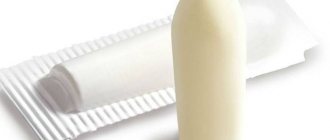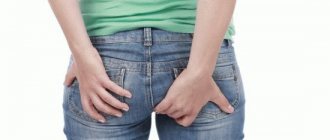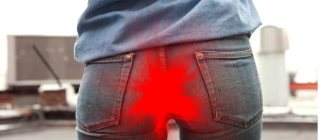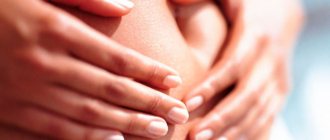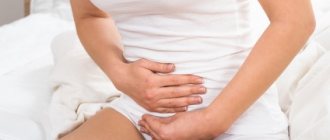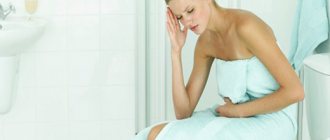What is diarrhea?
The medical term “diarrhea” is a condition where bowel movements occur too often. With normal nutrition and sufficient water consumption, bowel movements occur 1-2 times a day. If the number of trips to the toilet increases, diarrhea may be suspected.
The second determining factor is the consistency of the stool. Normal human excrement is quite hard and cylindrical in shape, but with diarrhea it changes to a mushy, semi-liquid, watery mass. Mothers mistake diarrhea during breastfeeding for an illness, but this is only a sign of it.
Why does diarrhea occur after childbirth?
The main provoking factor for diarrhea in women during the postpartum period is irritable bowel syndrome. It occurs due to irritation of the intestinal nerve receptors and its overly active peristalsis. The development of the pathological process is provoked by stress associated with anticipation of childbirth.
Diarrhea can also appear due to:
- hormonal imbalance (hormone levels are unstable after childbirth);
- taking antibacterial drugs (the development of intestinal dysbiosis is observed);
- rotavirus infection (the body is weakened after childbirth, the risk of infection is high).
Causes of diarrhea during breastfeeding
During breastfeeding, various factors can cause diarrhea. For example, food poisoning. It occurs when pathogenic microorganisms enter the body through food or poor-quality water.
An infectious process in the intestines also often causes diarrhea in the mother. Diarrhea develops due to the irritating effect of pathogenic flora on the intestinal mucosa.
Diarrhea is often caused by:
- allergic reaction to food, hygiene products, medications or cosmetics;
- failure to comply with personal hygiene rules.
Symptoms of diarrhea in a nursing mother
The illness occurs in different ways, but the general symptoms are the same:
- weak, lethargic state;
- abdominal cramps;
- dyspepsia;
- temperature increase;
- nausea.
Diarrhea and vomiting in a mother while breastfeeding are a serious reason to start treatment. Dehydration due to diarrhea occurs very quickly, which provokes serious complications - microelements are also excreted in the stool.
Important! If there are mucous impurities or blood in liquid stool, then urgent hospitalization is necessary. If the excrement turns black, an ambulance is called, since the symptoms indicate bleeding in the intestines.
Should I stop feeding my baby if he has diarrhea?
Pediatricians do not recommend weaning a baby if the mother is bothered by diarrhea. It is believed that breast milk supplies the newborn with antibodies that help fight infection. In addition, milk contains enzymes that can strengthen the child’s immunity.
If diarrhea is accompanied by obvious signs of poisoning, or the mother’s body temperature has risen and vomiting has begun, then it is recommended to wean the baby from the breast, but only for the duration of treatment.
There is no need to switch the baby to formula; after recovery, the mother can return to breastfeeding.
Causes of diarrhea
One of the harmless factors that provoke diarrhea during breastfeeding is the woman’s excessive anxiety. Inexperience gives rise to a lot of fears, and diarrhea begins against the background of stress. To restore emotional balance, you will need to consult a doctor who will prescribe medicinal teas or sedatives.
Taking a number of medications can lead to temporary stomach upset, so it is better not to self-medicate. Even when prescribing antibiotic therapy, the therapist will supplement the regimen with maintenance drugs that contain lactobacilli and bifidobacteria.
Diarrhea often occurs due to irritable bowel syndrome (IBS), with different clinical presentations:
- The intestinal mucosa is not affected by pathogens, so the temperature remains normal.
- Indigestion alternates with constipation. There is a false urge to go to the toilet or a feeling of incomplete bowel movement.
- When a nursing mother has diarrhea, her stomach hurts in the lower part, like before her period.
- Bloating and flatulence disappear after bowel movement.
Doctors cite hormonal fluctuations that occur in women after childbirth as one of the reasons for the development of IBS.
Intestinal infections
Throughout the entire period of lactation, the body of a nursing mother is weakened, therefore it is easier and faster to be attacked by microbes. Pathogenic bacteria produce toxic substances - in this condition, therapy with detoxifying drugs will be required. The acute question arises whether a mother can feed her baby breast milk if she has diarrhea, due to the risk of possible infection. To protect the baby, it is necessary to wash your hands frequently with soap, since skin-to-skin contact is the only route of transmission.
Allergy
An allergic reaction is manifested by an upset stomach and skin rashes, but this cause is extremely rare during lactation. A strict diet for a mother who is breastfeeding her baby eliminates diarrhea due to food irritants. A woman can afford to make mistakes in her diet after introducing complementary foods, but she is unlikely to indulge in an obvious allergen.
Poisoning
Symptoms are characterized by fever, as well as vomiting and diarrhea in a nursing mother. The likelihood of dehydration increases, so treatment under medical supervision is necessary. Food poisoning only affects a woman's intestines, without affecting the organs that are responsible for producing breast milk.
Foods that can cause diarrhea while breastfeeding
With a strict diet or food restrictions, a nursing woman sometimes wants to treat herself to something tasty. The intestines can react violently to such experiments, so everything new and “well forgotten old” should be introduced into the diet in small portions. However, there are a number of foods that cause diarrhea during lactation:
- Fried and fatty foods. It is difficult for the stomach to cope with foods that are too heavy, so excess fat will most likely lead to diarrhea. It’s not for nothing that doctors recommend completely eliminating such foods from the diet - diarrhea will appear in mother and baby during breastfeeding, since the child’s fragile intestines will also react violently.
- Mushrooms. Hard fibers are poorly digested, and the additional load on the gastrointestinal tract can lead to indigestion not only for nursing women. A child may experience such cramps and cramps in the tummy that a couple of sleepless nights are guaranteed.
- Alcohol. Any sane woman will completely eliminate alcohol during lactation, but not everyone is able to resist the persuasion of relatives at a family celebration. “You can’t get drunk from one sip” - it’s hard to argue with this statement, but a tiny amount of alcohol is enough to cause diarrhea. The leader in the list of record holders is red wine, which is considered the safest and even healthiest drink.
- Coffee. In addition to the diuretic effect, aromatic grains have the ability to liquefy stools, especially on an empty stomach.
- Vegetables. In order not to have to look for information on how to treat diarrhea during breastfeeding in a mother, it is advisable to give up legumes, zucchini and pumpkin. Or at least reduce their consumption to a minimum, given the laxative effect on the intestines.
- Dairy products. Small portions of kefir or yogurt are normally digested in the gastrointestinal tract, but an excess of live fermented milk cultures will lead to a “mutiny on the ship.” As breastfeeding experts advise, you need to know moderation in everything.
- Whole grains and dried fruits. The fibers of the listed plant crops are practically not broken down and are excreted undigested, causing stool liquefaction.
Medications for intestinal disorders
Treatment of diarrhea in nursing mothers is determined taking into account the cause that provoked it. What to do if intestinal upset is a consequence of a woman developing an intestinal infection? Severe forms of the disease require the use of antibacterial drugs, for many of which lactation is an absolute contraindication. If a doctor prescribes antibiotics to a young mother, she will have to stop breastfeeding for the entire period of therapy.
For mild forms of intestinal infections and food poisoning, young mothers can drink activated charcoal. Being a natural sorbent, it quickly removes toxins from a woman’s body and fixes stool. This drug is completely safe for children, so its use can be combined with breastfeeding. Instead of activated charcoal for diarrhea, a young mother is allowed to use Atoxil. It comes in powder form, which must be dissolved in water and taken between meals.
To prevent dehydration, a nursing woman can drink Regidron, which, like Atoxil, is produced in powder form. To prepare a medicinal drink, the contents of one sachet should be dissolved in 1 liter of boiled water. Drink the resulting liquid throughout the day, 2-3 large sips every 40-60 minutes.
The danger of diarrhea for mother and baby
For a nursing mother, you need to find a remedy for diarrhea as soon as possible, since the harm is only done to her body:
- important microelements are washed out;
- the risk of dehydration increases.
It is impossible to infect a child if basic hygiene rules are observed. Intestinal infections are transmitted by the fecal-oral route - the baby will get sick if he accidentally swallows particles of contaminated excrement. Bacteria are not transmitted with milk, but the baby can receive useful antibodies that will strengthen its immunity.
Only some methods of therapy (for example, taking antibiotics) pose a danger, so treatment should be prescribed by a doctor after determining the cause of diarrhea.
Intestinal infections
Many people associate the onset of diarrhea with poor diet, but this is not always true. In some cases, the cause of diarrhea is an intestinal infection. In adults, symptoms and treatment should be discussed with your doctor. Diarrhea can develop against the background of cholera or enterovirus.
The causative agents of intestinal infections are small in size. They are resistant to some disinfectants and to freezing. In feces, pathogens of intestinal infections remain viable for six months.
The virus enters the body of a nursing mother with contaminated water or poorly washed vegetables and fruits. Pathogens of intestinal infections can be transmitted in public places through dirty hands and contaminated objects. A breastfeeding woman can infect her own child after infection. Most of the population is extremely susceptible to intestinal infections, regardless of their immune status.
Is it possible to breastfeed while having diarrhea?
Is it possible to feed a baby if a nursing mother has diarrhea? This is one of the pressing issues that causes controversy with the older generation. Grandmothers are sure that any disease is transmitted to the baby, so they insist on stopping lactation. This is the most harmful advice that exists, since early weaning is fraught with negative consequences. If you wash your hands thoroughly after each visit to the toilet, your child will be completely safe.
To avoid doubts about whether it is possible to breastfeed if the mother has diarrhea, it is advisable to consult with a breastfeeding specialist in advance. Defending your own point of view during acute diarrhea is not the best option, so all controversial issues need to be discussed with relatives in advance.
Important! During an intestinal infection, the female body produces immune cells that pass through the milk to the baby, so it is even beneficial to continue feeding. It is sometimes necessary to interrupt lactation if therapy is incompatible with breastfeeding, but modern pharmacology offers many safe drugs.
FAQ (Frequently Asked Questions)
Stool upset in a nursing mother makes you think about maintaining the usual approach to lactation and the need to resort to additional measures in order to protect the child from the disease. In addition, many women are afraid to use medications - but what if they are really necessary? We will try to answer your questions one by one.
Is it possible to breastfeed if you have diarrhea?
Diarrhea can be caused by various reasons, but if a woman does not have severe intoxication and the need for massive pharmacotherapy, experts advise maintaining natural feeding in the usual volume. Firstly, the child will not be deprived of contact with his mother. Secondly, breast milk is the ideal nutrition for a newborn, and switching to formula is only done in extreme cases. It can also perform a protective function, given that it contains antibodies that support the child’s immunity.
The difficulty with diarrhea is that it is not always possible, especially at home, to understand: we are talking about an infection or an exacerbation of a chronic pathology, a reaction to a product that is too fatty or an allergy. Therefore, you should perceive diarrhea as a potentially dangerous condition in terms of infection and act preventively.
How to avoid infection of a child with diarrhea?
If a nursing mother encounters an intestinal infection, she becomes a spreader for some time - through feces, and sometimes even through airborne droplets (for example, rotavirus gastroenteritis). Of course, a small child, whose immune system is still imperfect, has difficulty resisting the pathogen. And therefore preventive measures are needed:
- regular hand washing - after going to the toilet, before picking up the child, etc.;
- if you have a runny nose or discomfort in the throat, wear a mask when in contact with the baby, changing it at least every 4 hours;
- wet cleaning, room ventilation.
A mother suffering from diarrhea should not try food with the spoon she will use to feed her baby (this is important for children already receiving complementary foods). It is also not allowed to dry yourself with a common towel or use the same cup.
Are antibiotics allowed for a nursing mother to have diarrhea?
Of course, there are pathological conditions in which the use of antimicrobial drugs is really necessary. In this case, antibacterial agents are prescribed, although the choice should be made among the safest options for the baby (that do not pass into breast milk or do not have a significant negative effect). Natural feeding should be stopped while using such groups of antibiotics as:
- Macrolides.
- Tetracyclines.
- Fluoroquinolones.
- Aminoglycosides.
- Chloramphenicol.
Diarrhea during lactation is not always a reason to take antibiotics.
These drugs act specifically on microbes. If diarrhea is associated with another cause (and even with an infection, but a viral one), at best they will pass through “transit”, and at worst, they will provoke dysbacteriosis and increased diarrhea.
What should a nursing mother take for diarrhea?
It depends on the cause of the bowel disorder. Of course, the drug load should be minimized, but at the same time the condition of the woman’s body must be taken into account. Sometimes pharmacological support is certainly indicated, and the faster the mother recovers, the better it will be for the child. The following are considered the safest:
- probiotics (contain live cultures of beneficial microorganisms);
- intestinal antiseptics (used for diarrhea of bacterial etiology);
- sorbents (drugs that absorb toxins);
- solutions for oral rehydration (replenishing the deficiency of fluids and salts (electrolytes));
- prebiotics (improve the functioning of favorable intestinal flora).
Read more about medications and indications for use in the “Treatment” section.
Does a nursing mother need a diet for diarrhea?
Unloading the diet is the first step in the treatment algorithm for any conditions manifested by loose stools. There is no need to worry about the quality of the milk - strict restrictions are observed for 24-48 hours (rarely longer, but severe cases require special attention). During the period of acute diarrhea, a woman is recommended to eat:
- Boiled rice in water.
- Crackers.
- Galette cookies.
- Baked apple.
- Boiled carrot puree.
- Jacket potatoes.
- Low-fat cottage cheese.
You can drink boiled or mineral water without gas. Whole milk and any fatty foods, pickles, marinades, and hot seasonings are excluded. Sweets, baked goods, and brown bread are also prohibited. The same goes for carbonated drinks, coffee, cocoa, and strong tea.
First aid for a nursing mother with diarrhea
You can cope with the primary signs of illness on your own at home if you take an effective absorbent:
- Smecta;
- Polysorb;
- Carbolene;
- Atoxyl;
- Lactofiltrum;
- Sorbex.
There is no clear answer to the question whether a nursing mother can use activated charcoal for diarrhea. It certainly won’t harm a woman or child, but it won’t bring much benefit. There are many modern and more effective means to eliminate diarrhea.
Additionally, you need to drink more than 2 liters of fluid to prevent dehydration. It is better to drink in small portions and small sips so as not to provoke vomiting. It is advisable to temporarily follow a gentle diet, eliminating food irritants. When the acute attack passes, you need to consult a doctor - he will identify the cause of the ailment and prescribe a course of adequate therapy.
What are the dangers of diarrhea after childbirth?
Diarrhea leads to dehydration in a nursing mother. As a result, the body loses nutrients and vitamins, and breast milk loses nutritional value. There should be no particular concern if diarrhea occurs infrequently, but otherwise it is recommended to seek help from a doctor as soon as possible.
If diarrhea is the result of infection with an infectious disease, not only the nursing woman is at risk, but also her child. In such a situation, self-medication is prohibited. The course of therapy should be carried out with medications and in no case with remedies from folk sources.
Treatment
The body can cope with many pathogens in a few days, but sometimes complex treatment may be necessary. Preparations with bifidobacteria will help normalize the intestinal microflora. The therapist will tell you which ones are needed in each specific case.
In case of severe dehydration, it is recommended to take Regidron, which restores the acid-base balance and prevents the excretion of electrolytes. The menu should consist of stewed and boiled foods, vegetable broths, light soups, water-based porridges, as well as fish and lean meats.
Taking medications is aimed at removing toxins, so when asked whether a nursing mother can take Loperamide for diarrhea, doctors answer in the negative. The effect of taking it comes very quickly - diarrhea stops, and the infection remains “preserved” in the intestines. This aggravates the condition and can lead to poor health.
Dietary requirements for intestinal upset
Regardless of the cause of the intestinal disorder, its treatment should begin with following a diet that will help reduce the load on the digestive organs and normalize stool. To get rid of diarrhea, nursing mothers must adjust their diet by eliminating all foods that have a laxative effect. These include:
- fresh vegetables and fruits;
- dairy products;
- fried food;
- black bread;
- baking;
- confectionery;
- vegetable and animal fats;
- spices and herbs;
- juices;
- sparkling water.
The diet for treating diarrhea during lactation should consist of boiled and steamed dishes (porridge, soups, lean fish and meat, hard-boiled eggs). A woman should eat small meals 5-6 times a day. To prevent dehydration, she needs to drink up to 3 liters of liquid (still water, weak green or black tea, raisin compote). As stool normalizes, a young mother can gradually expand her diet, including low-fat kefir, day-old bread, biscuits, baked apples, etc. It is important to ensure that a woman’s therapeutic diet is balanced and contains all the vitamins and microelements the child needs. To achieve a quick recovery, the diet should be combined with other treatment methods.
Treatment of diarrhea necessarily includes diet.
Folk remedies
Simple traditional medicine recipes will help you get rid of indigestion:
- 2 tsp. Pour ½ liter of boiling water over washed white rice and cook for at least 40 minutes over very low heat. Cool the broth, strain through a fine sieve, drink 50 ml every 3 hours.
- It is useful to drink dill water, as well as mint and lemon balm teas.
- Grind the peels of 1 pomegranate, pour 250 ml of boiling water. Infuse until the liquid turns color, then drink the decoction at a time.
- 1 tsp. oak bark, pour 300 ml of boiling water, simmer over low heat for no longer than 10 minutes. Cool the broth, strain, take 1 tbsp three times a day. l.
You can take advantage of the gifts of nature the first day after the onset of illness. If diarrhea continues for more than 3 days and the temperature does not subside, it is better to entrust your health to a therapist.
Poisoning
Diarrhea during breastfeeding in a mother can begin for several reasons. Very often, diarrhea occurs due to food or substance poisoning. If a woman feels very unwell, then she should call an ambulance. For example, if poisoned by mushrooms, a person can even die.
A serious condition occurs if a nursing mother has inhaled paint or mercury vapor. Women who lead an antisocial lifestyle may be poisoned by low-quality alcoholic beverages. Such an illness not only causes a serious condition in the mother, but also poses a danger to the child’s life.
You can get poisoned not only from chemicals or medications; diarrhea occurs after eating expired foods. The greatest danger comes from yesterday's salads dressed with mayonnaise. You cannot eat soups that have not been stored in the refrigerator, or expired food. If products have changed their appearance or have a strange smell, then they should not be consumed.
Prevention
To prevent the occurrence of diarrhea, it is enough to follow the recommendations:
- Observe proper storage of food, especially in the warm season.
- Do not buy food at “spontaneous” markets, even if you “always bought from this sweet grandmother.”
- It is better to throw away spoiled food without endangering your health - food poisoning can unsettle you for a long time.
- Wash your hands thoroughly when preparing food, before eating, after visiting the toilet, and upon returning from outside.
- Do not drink water from questionable sources.
- Avoid strong emotional experiences and stressful situations.
- Eat a balanced diet.
Diarrhea may indicate more than just a temporary digestive disorder. Often it is a signal of a serious illness, so dangerous symptoms cannot be ignored. During the period of illness, it is advisable for a woman to lower her demands on herself and not put all the worries about the baby on her own shoulders. You can ask close relatives for help, while maintaining strength for recovery.
Diarrhea due to poor diet
When a baby is born, a woman should reconsider her own diet and eat right. With a large number of dishes with spices and the consumption of fatty foods can cause intestinal upset in a nursing mother. If you neglect the rules, diarrhea will periodically bother the woman, which will lead to undesirable consequences.
In case of diarrhea due to heavy fatty foods, it is necessary to adjust the daily diet; a diet is prescribed throughout the lactation period.
A woman who has an infant should exclude foods that stimulate intestinal function (milk and dairy products), and reduce the intake of fruits and vegetables rich in fiber. Limit the consumption of spicy foods and pickles. Eliminate soda and alcohol!
During diarrhea during breastfeeding, cereal porridges, boiled meat, low-fat steamed fish are allowed, and the use of dried bread and crackers helps to quickly stop diarrhea.
If diarrhea occurs, regardless of the cause, remember to stay hydrated. To avoid it, you need to drink 3 liters of water a day.
